Facebook’s Content Eclipse
Among Dictionary.com’s definitions of the word “Eclipse” are the following:
- A reduction or loss of splendor, status, reputation, etc.
- To make less outstanding or important by comparison.

In the past I’ve always told my consulting clients that Facebook was a great place to find and connect with people who are interested in the products and services you offer, but to treat it (and every other social media website) as a breadcrumb that leads a trail to your official website. Facebook (and Twitter and YouTube and Foursquare and LinkedIn and insert-whatever-other-social-networking-site-you-can-think-of-here) is a great place to identify and connect with likely prospects, but a terrible place to conduct business transactions.
If you’re the store, Facebook is the mall.
If they decide to increase rent or change the location of the primary parking lot or decide the main entrance to the building to should at the furthest point to your store — there’s not much you can do about it. If you’re relying on some other entity to control your access to customers, you are at their mercy. And the longer you rely upon them, the more difficult it will be to break free when they finally take things too far for you to bear.
Ever since the company went public (and the demand for revenue increased among shareholders) Facebook has slowly been evolving from a place once viewed by its creators as a place filled with content creators and sharers and fans and followers, to one that is seen as a place filled with potential paying advertisers.
It’s been headed that way for awhile now.
First, businesses who once enjoyed posting to their fans and people who Liked their page (and began counting on their messages showing up in the content stream of everyone who said they were interested in receiving that content) realized that their messages were in actuality only reaching a very small percentage of those people. Then, friends and family members began realizing the same thing. they weren’t always getting 100% of the wall postings they were used to getting.
The reason soon became quite clear, as Facebook launched their feature allowing users to pay in order to Promote a post to a larger audience. The same audience they were once reaching for free. And it wasn’t restricted to advertisers — it now applied to everyone. You could pay to promote a personal post just as a business could pay to promote a marketing message.
Today, Felicia Day shared a link on her Facebook page (of which I am a fan) to a video of a guy basically complaining about the model above. I don’t disagree with the way he explains the Facebook changes, but I take issue with the fact he feels entitled to dictate any sort of business model they (Facebook) should be compelled to follow. If you’re serious about complaining, buy some stock and go to a shareholder meeting. By to rail against their (albeit misguided and ill-advised) attempts to generate money from the users of their site — all I can say is, it’s their ball (and bat and field and uniforms) and it’s their option to change the rules.
They are the Mall and you are a tenant that hasn’t paid rent since you moved in.
I think he answers his own question in the video.
If we’re all content producers (authors, actors, film makers, etc.) then we are also all advertisers.
I don’t like what Facebook has become, but neither do I begrudge them the right to do so. It’s their platform (their megaphone) so they can charge whatever they like for the public to access the audience. Personally, I think FB could have been great, but the push for a more traditional approach to generating revenue came with the company going public, so it’s not like the majority of people couldn’t have predicted it going off the rails.
The only mistake is relying upon some other company (Facebook, Linkedin, YouTube, Twitter, whatever…) to become a primary distributor of your message. What would you do when YouTube decides to do the same thing?
Take advantage of the opportunity to gain new audience members, subscribers, followers, etc. while you can — and then move them to a platform you control to continue the conversation and grow the relationship.
You should thrill in your ability to witness an eclipse while it’s happening, not complain about it when it’s gone.
.



